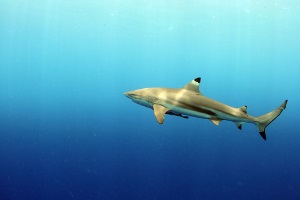315. Shark conservation and demand for tourism in the Maldives
As I’ve noted previously, diving with wild sharks is a growing tourism industry. It has the potential to increase the demand for shark conservation, in order to maintain the economic benefits to tourism operators, and the benefits to tourists. Here we quantify these benefits in the Maldives, as well as the cost of worsening conservation.
The Republic of the Maldives is a small island nation in the central Indian Ocean. The country is composed of about 1200 islands of which 200 are inhabited, around 122 are assigned as resort islands, and the remainder are uninhabited.
Tourism dominates the nation’s economy, accounting for 27% of the gross domestic product in 2014. Diving and snorkelling are the most popular activities of tourists.
 In 2010, a shark sanctuary was implemented in the Maldives when the declining status of shark fisheries and concerns over decreased shark sightings from divers encouraged the government to announce a total ban on shark fisheries in its waters. Today, shark populations are recovering in most, but not all, atolls.
In 2010, a shark sanctuary was implemented in the Maldives when the declining status of shark fisheries and concerns over decreased shark sightings from divers encouraged the government to announce a total ban on shark fisheries in its waters. Today, shark populations are recovering in most, but not all, atolls.
However, the new regime is not without challenges. One is the ability of the government to actively enforce the ban on shark fishing. Another is the fact that it is still legal to sell shark jaws and teeth in tourist shops, creating an incentive for illegal fishing. Reef fishermen don’t like sharks eating their potential catch, and have been observed killing them.
On the other hand, conserving sharks is in the interests of dive operators and resorts. Some resorts report illegal fishing activities to authorities and refuse to buy fish from fishermen that have landed sharks.
Led by PhD student, Johanna Zimmerhackel, we investigated the link between shark conservation actions and economic returns from diving tourism. A survey-based approach (travel cost combined with contingent behaviour) was used to estimate the dive trip demand under different management scenarios.
 Our results show that increasing shark populations could increase dive-trip demand by 15%, raising dive tourists’ welfare by US$58 million annually. This could result in annual economic benefits for the dive-tourism industry of more than US$6 million.
Our results show that increasing shark populations could increase dive-trip demand by 15%, raising dive tourists’ welfare by US$58 million annually. This could result in annual economic benefits for the dive-tourism industry of more than US$6 million.
Conversely, in scenarios where shark populations decline from their current levels, where dive tourists observe illegal fishing, or if dive operators lack engagement in shark conservation, dive trip demand could decrease by up to 56%. This decline causes economic losses of more than US$24 million annually to the dive tourism industry.
These results highlight the dependence of the shark-diving industry on the creation and enforcement of appropriate management regimes for shark conservation. These results are important given the shameful over-exploitation of sharks in many parts of the world, particularly to satisfy the pointless demand for shark fins (flavourless cartilage) for shark-fin soup in Asia.
Further reading
Zimmerhackel, J.S., Rogers, A.A., Meekan, M.G., Ali, K., Pannell, D.J. and Kragt, M.E. (2018). How shark conservation in the Maldives affects demand for dive tourism, Tourism Management 69, 263-271. Journal web page * UWA Paper Repository
Zimmerhackel, Johanna S & Pannell, David J & Meekan, Mark & Kragt, Marit E & Rogers, Abbie, (2016). Diving Tourism and Fisheries in Marine Protected Areas: Market Values and New Approaches to Improve Compliance in the Maldives Shark Sanctuary, Working Papers 243921, University of Western Australia, School of Agricultural and Resource Economics. IDEAS page